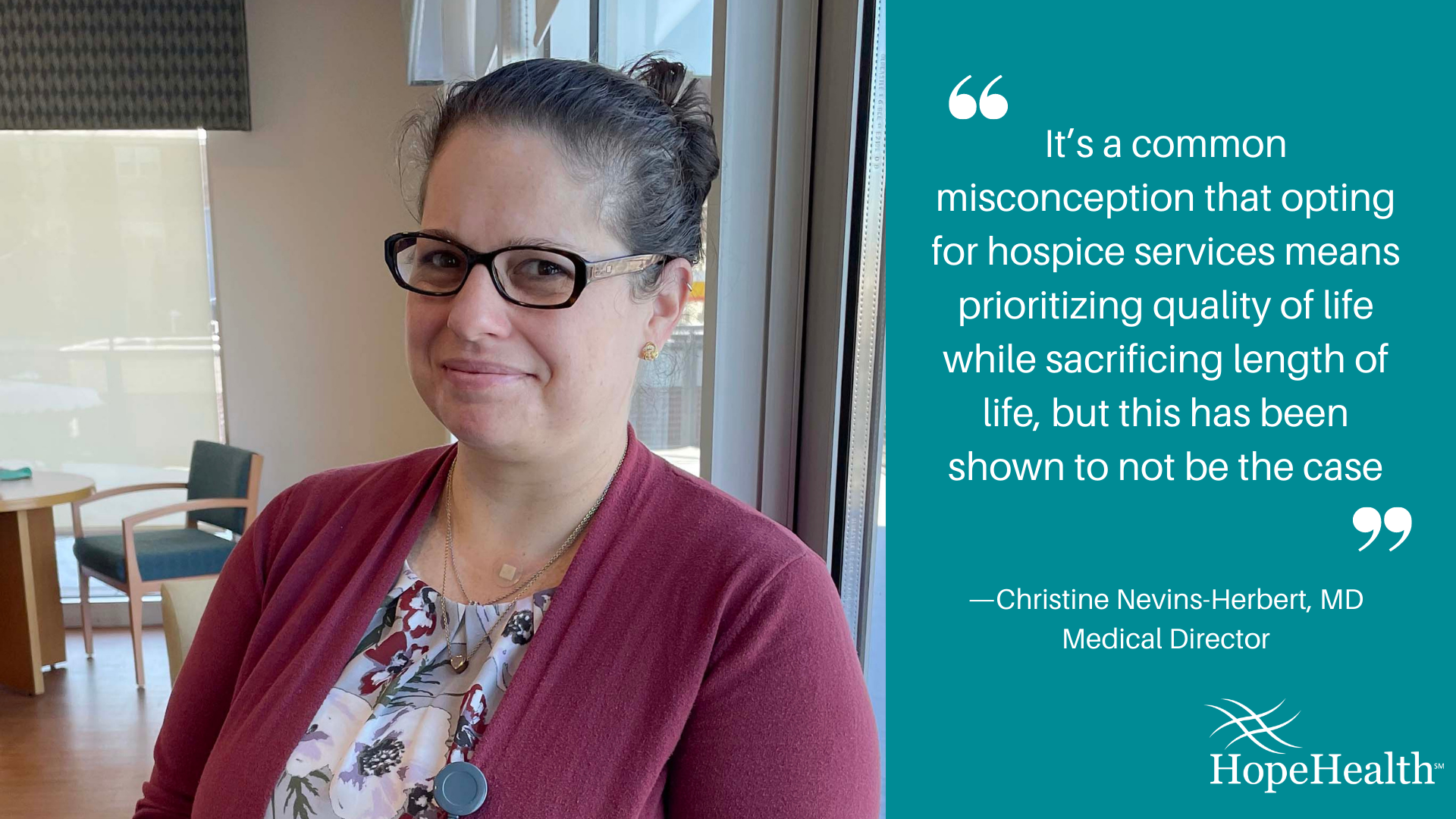Marian is 86 years old, and her health appears to be relatively stable. She lives alone and does her own shopping at her corner market, though she has help come to her home to do her laundry.
But Marian is in the hospital for the third time in the last six months for heart failure. For the last 20 years, she has lived with coronary artery disease. She also has hypertension and mild chronic obstructive pulmonary disease (COPD), a chronic inflammatory lung disease that causes obstructed airflow from the lungs.
After a couple of days in the hospital, Marian is stable again and ready for discharge. She wants to stay in her own home, but her episodes of shortness of breath and swelling in her legs and feet are becoming more frequent. That’s making it more challenging for her to take care of herself and her household.
Could Marian be a candidate for hospice care?
The answer is yes, says HopeHealth Clinical Educator Lisa Wasson, RN.
“Even though she looks stable, the fact that she doesn’t want to go back to the hospital is a very significant statement,” Lisa Wasson says.
Lisa teaches a course for clinicians on how to recognize when cardiac patients are transitioning to end of life and how hospice services can benefit them. Identifying such patients isn’t as easy as you think because many patients with advanced heart disease appear to be stable and living safely at home. Like Marian, many experience a revolving door pattern of going in and out of the hospital in order to keep their symptoms under control, Lisa says.
“Even though she looks stable, the fact that she doesn’t want to go back to the hospital is a very significant statement.”
“It is challenging to help them to see that hospice can manage all of their symptoms in their home rather than the constant trips back and forth to the hospital,” Lisa adds.
Many miss out on vital services
Advance care planning and end-of-life conversations are appropriate for Marian. Unfortunately, they do not occur regularly for heart failure patients like her.
Even though heart disease is the leading cause of death in the U.S., only about 17% of hospice patients over age 65 who died in 2018 had a primary diagnosis of heart disease, according to the National Hospice and Palliative Care Organization. That’s compared to 30% of patients with an advanced stage cancer diagnosis receiving these important comfort and supportive services, which are covered by Medicare and most insurance plans.
Research has shown that heart failure patients and cancer patients have similar needs for mental health and spiritual care. Hospice care teams include social workers and chaplains who can address concerns about a patient’s emotional and spiritual wellbeing.
“Patients as well as families and even medical providers usually believe that hospitalization is the only option when they are feeling acutely worse, and they often feel better after being hospitalized,” says HopeHealth Medical Director Christine Nevins-Herbert MD.
“However, while chronic heart failure patients often feel better than they did at the time of hospital admission, they continue to have a downward trend in their overall health, functional status and quality of life.”
Heart failure patients who enroll on hospice benefit from having 24/7 access to skilled clinicians who may be able to prevent frequent trips to the emergency room. Hospice patients also receive weekly visits from a hospice nurse to assess their condition, check vital signs and adjust medications if necessary. If they need a higher level of hospice care, they may be admitted to a skilled nursing facility or to a hospice inpatient center, such as the HopeHealth Hulitar Hospice Center.

Hospice eligibility criteria
In order to be eligible for hospice services, a patient must have a terminal illness and a life expectancy of six months or less. Patients with heart failure are likely to qualify for hospice if they:
- Reach the limit of treatment with available medications — diuretics and vasodilators, such as beta blockers and ACE inhibitors— and there are no surgical options.
- Experience fatigue, palpitations, chest pain and/or shortness of breath with even minimal exertion.
These are not the only signs a patient with heart disease is transitioning to the end of life stage. Clinicians will take note if a patient’s echocardiogram test shows an ejection fraction range below 20%. This measures the pressure of blood leaving your heart each time it contracts; a normal ejection fraction reading is between 50% to 75%, according to the American Heart Association.
Higher ranges—typically up to 35%—may still qualify someone for hospice, especially if the patient has a history of cardiac arrest and frequent ER visits, Nevins-Herbert says. A type of heart failure commonly called diastolic heart failure is associated with higher ranges. These patients have a stiffening of the left ventricle, which can still pump well but cannot relax and fill with blood as well as normal.
Clinicians pay close attention when a patient also has a history of cardiac arrest or resuscitation, unexplained fainting and abnormal heartbeats or if they have other conditions like COPD, diabetes, kidney disease and HIV. These conditions are likely to decrease the length of survival for a person living with heart disease.

Why hospice?
“It’s a common misconception that opting for hospice services means prioritizing quality of life while sacrificing length of life, but this has been shown to not be the case,” Nevins-Herbert says. “While the goal of hospice is neither to prolong someone’s life nor hasten someone’s death, hospice patients generally experience lower rates of hospitalization, admission to the ICU, and invasive procedures at the end of life.”
Most importantly, patients receiving hospice care are kept as comfortable as possible so they can make the most of the time they have left with loved ones. Some research has even found that hospice care is associated with longer survival in some heart failure patients.
“Patients and their family caregivers need to understand hospice is an option and what that means for them and the extra services they will receive,” Lisa says.
“With hospice care, we can help keep you home where you want to be and not back in the hospital.”

